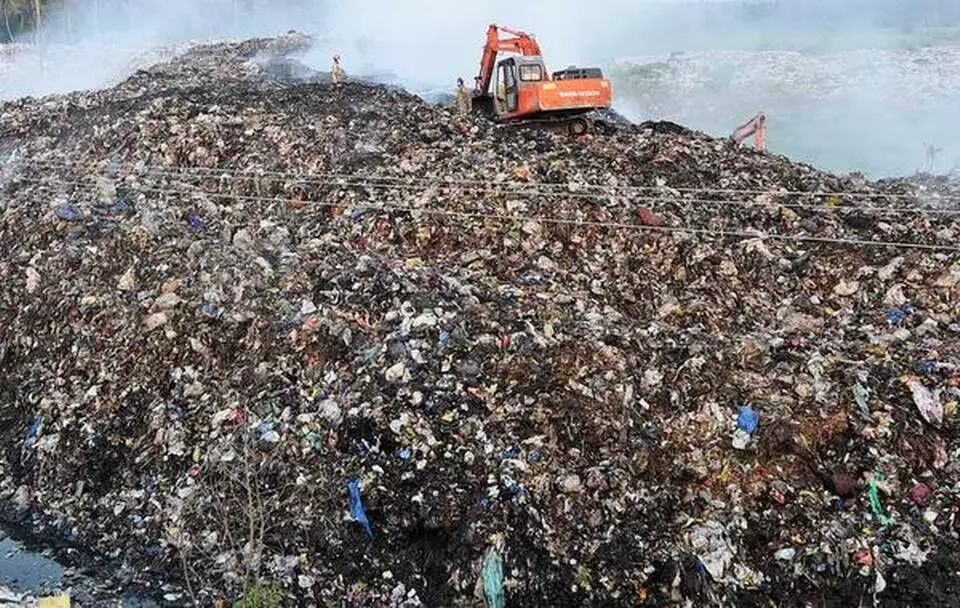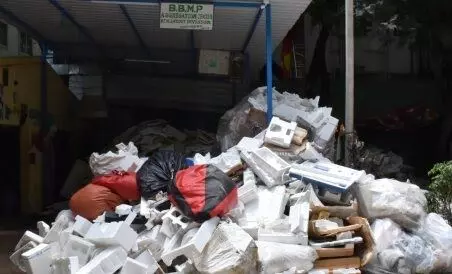
May the mind and soil be clean
text_fieldsThe State Cabinet approved ordinances to take strict action against negligent and careless waste handling. Under amendments proposed to the Kerala Municipality Act and Kerala Panchayat Raj Act, failure to segregate and manage waste will be seen as a non-bailable offence and a hefty fine will be imposed. A fine of Rs 1000 to Rs 50,00 and imprisonment from six months to one year will be imposed on those who throw garbage in public places or water bodies. Those who dump sewage and garbage into water bodies will be fined Rs. 10,000 to Rs 50,000 and imprisoned from six months to one year. If Organic-inorganic wastes and domestic hazardous wastes are not given to the local self-governing body or related agencies, a fine of Rs 1,000 to 10,000 will be imposed. There will be a fine of Rs 1,000 to Rs 10,000 if separate waste bins are not made available. Rs. 5,000 will be fined for throwing or burning waste on the premises of commercial buildings. If there is an environmental problem due to the accumulation of garbage in public places, the secretary or concerned officials of the local bodies will be punished. Those bodies that do not follow instructions will be penalized by the government. The state government has formed an ordinance that has made the punishments stricter and more systematic.
It is regrettable that in a state renowned for its literacy, there is a declining sense of cleanliness and hygiene. A state that takes pride in being God's own country is in a terrible situation as a result of garbage accumulation brought on by excessive consumption. In actuality, Malayalis dirty their neighbours' spaces in order to tidy their own area. The foul-smelling public area is evidence that Malayli has turned to discarding trash from his vicinity and causing harm as a vicious hobby. It is unfortunate that the first thing that one remembers about every major Kerala city is stinking public areas and heaps of trash. How long did the garbage dump in Brahmapuram, Cochin burn drowning people in poisonous smoke? When dumpsters burn and people protest against it while gasping for air, the authorities will realise how important cleanliness and hygiene are. Punishment and rules will be developed. May this ordinance remain unchanged, unlike the usual chant of hygiene.
There is no shortage of strict rules. The right to live in a pollution-free and clean environment is mentioned in the Constitution as a fundamental right. Chapter 14 of the Indian Penal Code explains the penalty for harming public health. Sections 268, 269, 270, 277, 278, 284, and 291 are related to this. Non-segregation of solid waste, discarding waste in public places without following the instructions of local authorities, disposing of waste from businesses and hospitals without proper treatment, burning or throwing solid waste, starting businesses, hotels, restaurants, gated communities without adequate waste management systems, etc., as well as handling garbage carelessly as specified by the current ordinance, have all been declared crimes. In addition, the state government has started a number of programmes and initiatives for disposing of waste. A total of 1018 units of Haritha Karma Sena, a women's organization, have been established in the state for the collection, treatment and recycling of non-biodegradable materials - 926 units with 23,546 women in villages and 92 units with 4,678 women in cities. The Sena which operates under the leadership of the local bodies is under the supervision of the Suchitwa Mission, Haritha Keralam Mission and Kudumbashree. Each member collects around 250 door-to-door inorganic waste. The systematic process from waste collection to treatment is recorded by the government. But, to know its effectiveness in practice one just has to leave our locality and city. The government has introduced various other schemes like Zero Waste Kerala, solid waste management, Harithamithram App, Green Office and so on. But the new ordinance makes it clear that even with all of these, it has not made much of a difference. According to official figures, 25 lakh tons of waste is produced in the state every year. 69 per cent is organic and 31 per cent is inorganic waste. Citizens should ensure that the inorganic waste is desposed in the source itself. The government has prepared systematic ways from door-to-door collection to recycling. The common man has to cooperate to ensure that it is happening properly. Authorities can only give awareness and make regulations. All of us need to be committed for these to succeed. Let us join hands and work together with love for the environment to preserve and enhance the natural world, rid it of pollution, and enhance it.


























